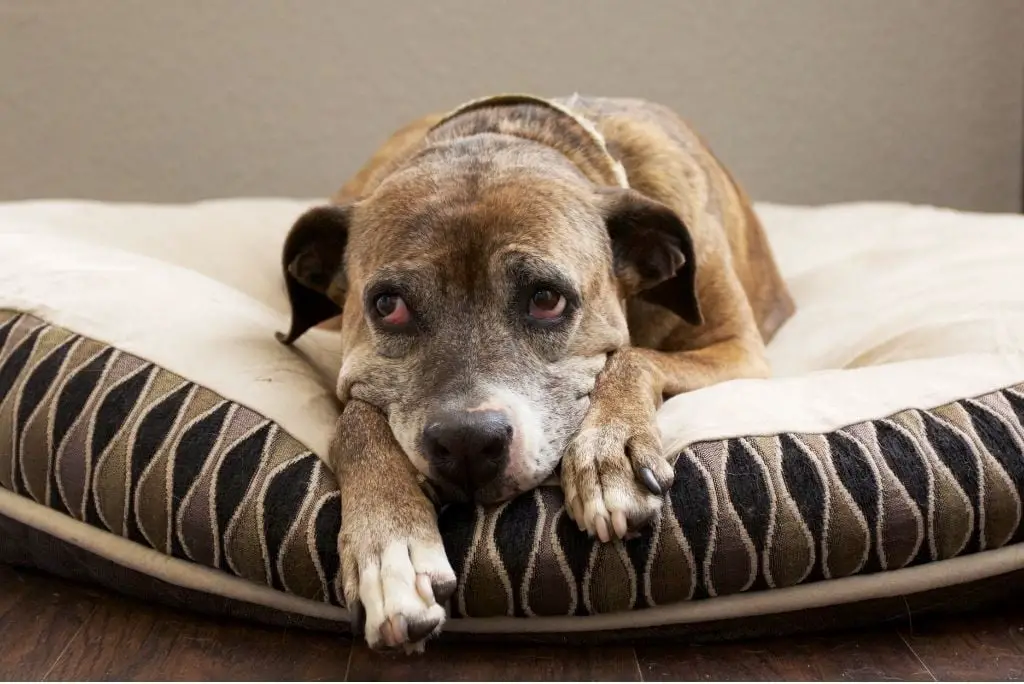Dementia is a medical condition that can affect both humans and animals. Dementia in dogs, most commonly known as canine cognitive dysfunction (CCD), impacts the brain’s ability to function properly and can be difficult to identify and treat. It’s important for every dog owner to recognize dementia in their senior dog so they can get their pets the treatment they need. In this blog post, we’ll talk about what dog dementia is, how it affects dogs, and what you can do about it.
Article contents
What is dementia and how does it affect dogs?
Dementia in dogs, or canine cognitive dysfunction, is one of the most common age-related issues seen in senior dogs and it’s similar to Alzheimer’s disease in humans. This disease affects a dog’s brain and body and can make it hard for them to think and move like they used to. Canine dementia affects roughly 22.5 % of senior dogs older than 9 years. It is caused by a decrease in brain function which results from inflammation or degeneration.
Signs of dementia in dogs
Dogs can’t tell their owners when they’re feeling a little foggy, so it’s up to you to notice the warning signs. Most signs are not identified until at least 8 to 10 years of age. An older dog suffering from canine cognitive dysfunction syndrome will typically display one or more of the following signs:
- Disorientation or confusion
- Less interest in activities they used to enjoy
- Loss of house training or increased accidents around the house
- Changes in sleep patterns and restlessness during sleep (mostly at night)
- Irritability or mood swings
- Barking and whining for no apparent reason, often at inappropriate times such as late at night
- Changes in interaction with family members and other pets
- Reduced ability to learn new things and respond to their environment
If you notice any of the above mentioned signs, don’t be afraid to ask a veterinarian for help.

How to prevent dementia in dogs
As a pet owner, you want your furry friend to be healthy and happy for as long as possible. And dementia is not something you want to deal with when your dog becomes a senior. Fortunately, there are some things pet owners can do to prevent dementia in dogs or slow down the progression of this disease so that their pets may live long and happy lives, such as
- Keeping your dog active by taking them on regular walks and encouraging play
- Avoiding being overprotective and allowing your dog to explore their surroundings
- Providing a healthy diet to manage your dog’s weight as obesity can worsen dementia symptoms in dogs
Together these techniques will help keep your dog’s mind strong as long as possible.
Treatment of dementia in dogs
If you suspect that your senior dog may be suffering from dementia or canine cognitive dysfunction, speak with a veterinarian about a treatment plan. There are a variety of treatments for canine dementia that can help ease your pet’s symptoms and improve their quality of life, including the following:
- Medications to reduce anxiety or treat depression;
- Environmental enrichment using puzzle toys to stimulate brain function and encourage physical activity;
- Supplements such as DHA omega fatty acid which is known to help with dementia;
- Changes in diet including reduced carbohydrate intake for prediabetic or diabetic dogs.
Dementia is a difficult condition for both you and your pet, but there’s no need to suffer through it alone. Talk with your veterinarian about dementia treatment options so that you and your dog can enjoy its golden years together.

How to care for a dog that has been diagnosed with dementia
Treatment of dog dementia will depend on the cause and symptoms it is causing. However, there are some things you can do to help your dog better adjust to this condition, such as:
- Provide a safe and comfortable environment
- Make sure to keep your dog active, both mentally and physically
- Stimulate your dog with different activities including training
- Keep exercise routine regular but not too exhausting
By taking these steps and providing a good home environment to care for your pet’s needs properly, you can help ensure your dog has an easier time dealing with this difficult condition.
Making sense of it all
It’s sad to see your loyal companion lose their memory and enter a cognitive decline, but there are steps you can take now to help your dog live a happy and healthy life even when its cognitive function is compromised. A veterinarian will be able to diagnose the problem more accurately once you’re able to describe the signs you have seen in your dog. If it is canine dementia, your vet may be able to help you manage this condition with medication or supplements.
